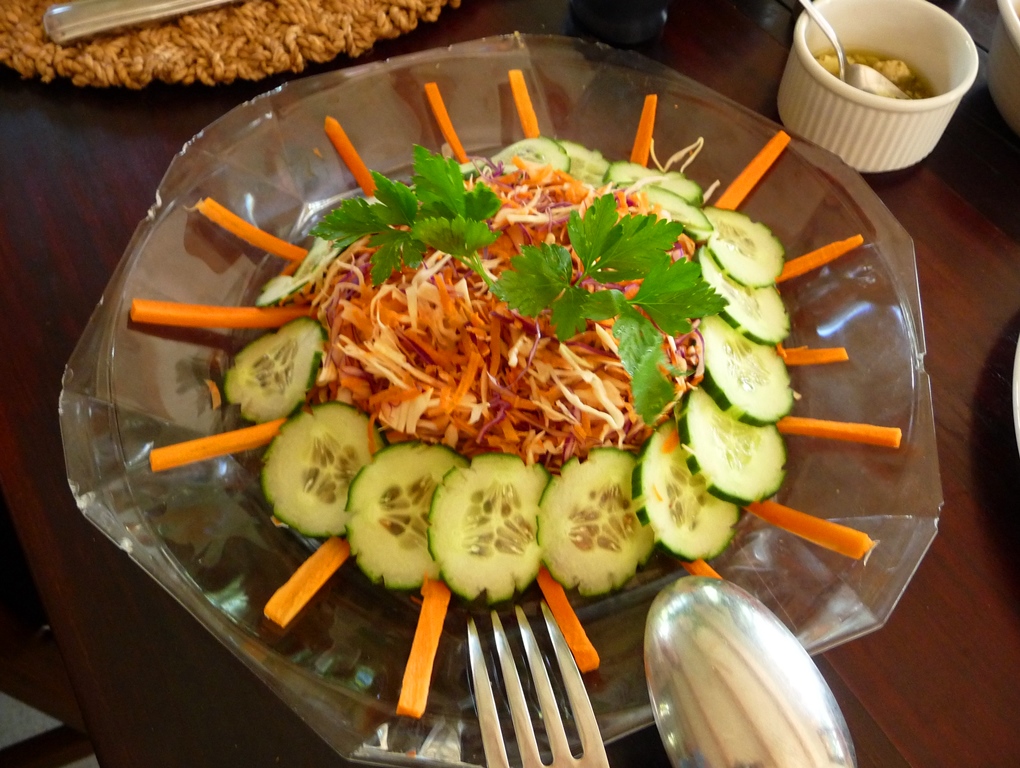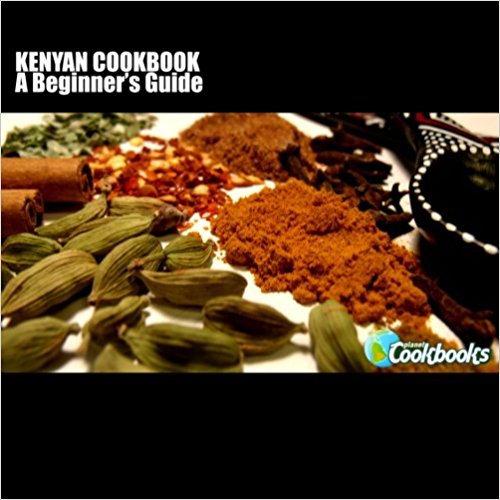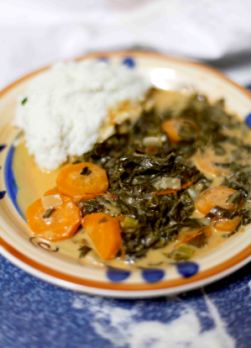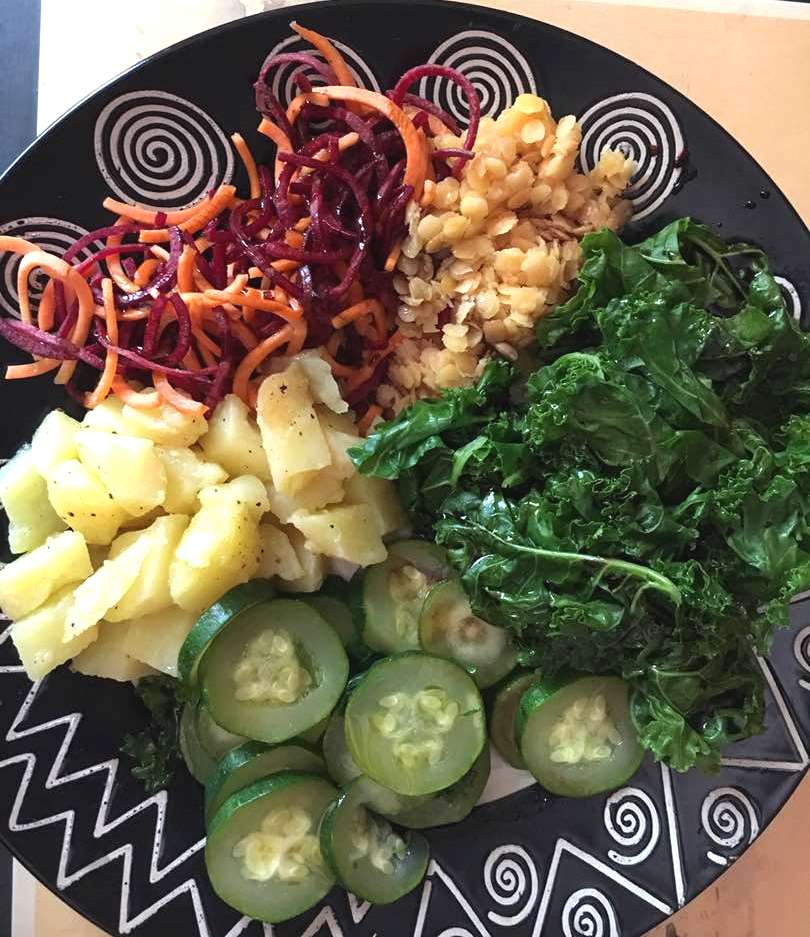Kenya Recipes

Here are some of the most essential Kenya recipes; Ugali (Cornmeal Porridge) being considered the national dish.
If you are looking for some culinary culture, go towards the coast. Although the variety & standard of restaurants in Nairobi is really good and there are lots of choices, it is always nice to go to the coast and that's a great excuse! ;-)
There is a long association with the Indian Ocean trade which created some very characteristic regional cooking; rice and fish, flavored with wonderful coconut. Tamarind and other exotic spices are the main ingredients.
When Kenyans go out, they go for a big blow-out feast, which is always a huge pile of nyama choma (roast meat). You can order your meat of choice; goat, beef, mutton or chicken, and the way you prefer to eat it; either cooked, fried or roasted.
If you are a vegetarian, don’t worry. Kenya recipes offer a lot to choose from. Besides an abundance of delicious assortments of fruit, there are numerous vegetable dishes to ponder about.
Meat-free pasta dishes, omelet’s, vegetables and potatoes. This East-African country truly has an amazing array of mouth-watering, fantastic vegetarian dishes, topped at the end of a meal with fresh fruit salad. Yummy!!! (As you might guess, I am a Vegetarian ;)

There are also beautiful Italian and Indian restaurants and everything is very fresh & very delicious. So, no worries, there is something for all of us and everybody’s appetite will be satisfied.
Oh, by the way, beer, in Kenya, translates to TUSKER. On a hot day, which there are a lot in Kenya, a cold Tusker beer...mmmmmhh...very hard to beat!! On each bottle it says "Bia Yangu, Nchi Yangu", (My Beer, My Country) and it sports the famous label of an elephant with tusks in black, yellow and white. And YES, I do like it! A LOT!!
The Tusker Lager is brewed using the highest quality malted barley grown in the great, big Kenyan Rift Valley, Hops and Water. What else does it need?! It is fantastic and you’ve got to try a Tusker beer when you are in Kenya. Oh, and don't forget the new Malt version! It's a close call between the two.
If you like Cookbook, here is one that will give you a great introduction and is full of Kenya recipes.

For the ones with the biggest sweet tooth, you can go directly to our Kenya Dessert section! OH, and if you have a Kenya recipe that you didn't see here and would like to share with us, PLEASE DO!! (Go to the Kenya Dessert page and submit from there. Thank you.)
UUHH, and NOT to forget is some wonderful bold Kenya Coffee OR some delicious Kenya Tea with your dessert and not to be missed after dinner. Well, or whenever your graving for a 'good' cup of coffee or tea kicks in!
Here we go, Kenya Recipes coming up:
 Ugali & Sukuma Wiki
Ugali & Sukuma WikiUgali
(Cornmeal Porridge)
Ingredients:
1 cup cold water
1 cup yellow cornmeal (the Mexican flour ‘Mozerapa’ is a close substitute to the Kenyan flour)
1 teaspoon salt (optional)
3 cups boiling water
Serves 4 to 6
Put cold water in a medium-size saucepan, add cornmeal and salt, mixing continually. Bring to a boil over high heat, gradually stirring and slowly add 3 cups of boiling water to prevent lumps.
Reduce to simmer, cover and cook for about 8 minutes, mixing frequently to prevent sticking.
The ugali will be done when it pulls from the sides of the pan easily and does not stick. It should look like stiff grits.
You can serve ugali with everything from meat stew to sugar and cream. Your choice!
Here is a little more information about 'Ugali'. ENJOY!!
Vegetable Curry
Ingredients:
2 large onions, finely chopped
2 tblsp. oil
1 tsp. cumin seeds
1 tsp. mustard seeds (the black kind, if possible)
8 medium potatoes, quartered
1 and 1/2 tsp. fresh ginger, crushed
1 large garlic clove, minced and crushed
1 tblsp. ground cumin
1 tblsp. whole coriander, crushed
2 chili peppers or 1 tsp. cayenne pepper
1/2 tsp. turmeric
1 tsp. salt
4 cinnamon sticks
6 cloves
4 oz. tomato paste
1/2 lb. green beans
1/2 of a small cauliflower
1 medium eggplant
1/2 lb. fresh green peas, shelled, or 1 small package of frozen green peas
1 bunch of fresh leafy greens (kale, spinach, collards, etc.), or 1 small package of frozen greens
1/2 cup dry chickpeas, cooked (optional)
Serves 6
Pre-heat oven to 350 degrees. In a large, heavy skillet or pot, brown the onions in moderately hot oil along with the cumin seeds and mustard seeds.
Add the potato pieces (peeling is optional), and stir to coat each piece with the spices. Now add the remaining spices and continue to stir for several minutes.
Thin the tomato paste with about 2/3 cup of water. Stir into the pot. Add vegetables, one at a time, cooking for a minute or so between each addition, and put in the cooked chickpeas last.
If your pot is not oven proof, transfer mixture to one that is.
Cover with a lid or seal with foil and bake for about 45 minutes, checking after the first 20 minutes.
The consistency should be rather thick, but add liquid if necessary to prevent burning. Stir occasionally to prevent sticking.
Serve over rice or with Indian bread.
(This recipe is from ‘Tim’s and Lara Beth’s Kenya Page’ and it is delicious!!)
Samosas
Ingredients:
1 inch piece ginger root
6 cloves of garlic
2 pounds ground lamb/beef OR a variety of choped up vegetables (Carrots & Cabbage)
3 large onions, thinly sliced
1 tablespoon mussala
1 tablespoon curry powder
1 tablespoon turmeric
Salt (optional)
2 pound frozen egg-roll dough, thawed
Flour
Oil
Makes 80 servings
Chop the ginger and garlic very fine or if you have a blender until well mashed. Add the meat OR vegetables, onions, mussala, curry powder and turmeric.
Sauté in a heavy frying pan on low heat for about 30 minutes. If you opt for the meat, do not add oil and stir occasionally to break up the meat; for the vegetables sauté until nice and done.
Cut sheets of thawed egg-roll dough into 4 by 4 inch quarters to end up with a nice triangle. Put some of the meat OR vegetable mixture in the middle; just about the amount to end up with a nice, neat triangle. To secure use a paste made out of flour and water.
Deep-fat fry the filled samosas, a few at a time, until golden brown.
They are great to keep in the freezer, and to serve, just thaw and place in a hot oven until hot.
Chapati
Ingredients:
2 cups of Flour
1 teaspoon salt
Water
Serves 4
Sift the flour and the salt into a mixing bowl. Add some water to make a fairly stiff dough, moistening your hands frequently to ease off the bowl.
Shape dough into a ball, cover the bowl with a damp cloth and let it stand for at least ½ hour.
Divide dough into 4 or 5 balls and roll each out into a flat, round disk.
Heat a large creased griddle or frying pan over medium until it is hot. Cook each chapati until golden; when you see tiny bubbles it’s time to turn them over. It should take about a minute for each chapati.
Press them down with a wide pancake turner or a clean towel to cook evenly. Serve hot.
Tip: You can try different combinations of flour. For example 1 ½ whole grain flour & ½ cup all purpose flour OR 1 ½ cup whole wheat flour & ½ low-fat soy flour....
Irio
Ingredients:
1 cup dried peas (or canned peas)
1 lb canned corn or 6 ears of fresh corn
Several potatoes or instant mashed potatoes
½ lb pumpkin greens or spinach
Lima Beans (optional)
Chopped fried onions (optional)
Black pepper
Salt
Serves 8
Boil dried peas until détente, drain and set aside. Also boil the potatoes, corn, lima beans, and the greens, drain and set aside.
Mix the fried onions with all the above, add salt & pepper to taste and mash.
The consistency should be that of firm mashed potatoes. You can also add a little bit of butter if desired.
The leftovers taste great the next day when fried with a bit of oil in a pan.
Plantains in Coconut Milk
Ingredients:
3-4 plantains, sliced in rounds
¼ teaspoon of salt
1 teaspoon of curry powder
½ teaspoon of cinnamon
1/8 teaspoon cloves
1-2 cups of coconut milk
Serves 4 - 6
Combine all ingredients, except the coconut milk, in a heavy saucepan and stir. Pour in 1 cup of coconut milk and simmer over low heat until the plantains absorbed the milk and are very tender. It takes a while for them to get soft; give them about the same time you would need for cooking potatoes.
You can add more coconut milk if you desire.
Serve hot and try with fish or curries.
Note: The wonderful thing about plantains is that they truly are a versatile food. As a plantain ripens, its high starch content changes to sugar.
Plantains are good at any stage; it just depends on what you want to make. Plantains are a relative of the banana, but are bigger, less sweet and need to be cooked before they are eaten. Plantains also keep their shape when cooked, unlike bananas, which get mushy.
Green or "unripe" plantains contain a lot of starch and very little sweetness. Their starchy flesh is used more as a vegetable than a fruit. They can be used in soups, stews, boiled and mashed.
A ripe plantain can be used in savory or sweet dishes. You can pan-fry them with some butter, rum, and brown sugar and serve over ice cream. When buying ripe plantains, they should be firm and not mushy or cracked.
When peeling plantains or green bananas, moisten hands and rub with salt to prevent the juices from sticking to your hands.
Cut off about 1 inch from both ends of the plantain.
Using a sharp knife, make 2 lengthwise cuts at opposite ends of the plantain.
While holding the plantain steady with your left hand, use your right hand to slide the tip of the knife under the skin and begin to pull it away, going from top to bottom.
Soak the peeled plantains or bananas in salted water.
Drain on a paper towel to use in your recipe.
 Veggie Plate
Veggie Plate
Kunde
(Kenyan black-eyed peas & tomatoes)
Ingredients:
2 teaspoons Oil
1 Onion
2 cups tomatoes
2 cups black-eyed peas
1/4 cup peanut butter, natural or roughly grounded peanuts
¼ cup water
Salt & Pepper
Serves 4-6
Heat oil over medium heat in a saucepan.
Mince onions and sauté lightly until translucent. Add diced tomatoes and simmer about 5 minutes to cook down.
Cook the black-eyed peas and add with all remaining ingredients and mix well. Lightly mash the peas with a fork.
Simmer about 10 minutes over medium heat, stirring occasionally. Add more water as needed to get a stew-like consistency.
Serve with rice.
Sukuma Wiki
Ingredients:
6 cups chopped fresh collard greens
3 tablespoons olive or vegetable oil
1 medium onion
1 cup stewed tomatoes
1 green chili pepper (seeded & chopped)
3 tablespoons lemon juice
1 tablespoon flour
½ to 1 cup water
Fill the bottom of a saucepan with about an inch of water. Insert strainer filled with greens and bring water to boil over high heat. Turn down if water begins to evaporate. Cover and steam for 8 minutes.
Chop the onion and tomatoes.
Heat oil in a skillet over medium high heat. Add onions, tomatoes, chili pepper and sauté until the onion is clear. Reduce heat to low. Add additional oil to prevent sticking.
Mix lemon juice, flour and ½ cup water in a small bowl until well blended.
Pour into onion mixture and mix well. Add ½ cup water, cooked greens, salt and pepper and mix well. Increase heat to medium, cover and cook for about 3 minutes.
Mixed Greens, Kenyan style
Ingredients:
1 Serrano or Jalapeno pepper, chopped
2 teaspoons salt
2 teaspoons freshly grounded black pepper
2 tablespoons olive oil
1 pound fresh collard, mustard or turnip greens, chopped
OR
1 bag / 10 ounces frozen chopped greens, thawed
1 pound fresh spinach, chopped
OR
1 bag / 10 ounces frozen chopped spinach, thawed & squeezed dry
2 tablespoons butter
3 large tomatoes, cubed
1 large yellow onion, peeled & chopped
1 cup canned unsweeten coconut milk
4 teaspoons dry roasted peanuts, chopped (optional)
Serves 6
Fill a large pot half-full with water. Add the chile pepper, salt, black pepper, and 1 tablespoon of the olive oil. Bring to a boil over high heat. Add the greens and spinach. Reduce the heat to low and cook for 20 minutes, stirring occasionally.
Heat the remaining 1 tablespoon oil and the butter in a large skillet over medium heat. Add the greens and spinach, tomatoes, onions, and milk and simmer for 10 minutes, stirring occasionally. Taste the greens for tenderness and seasoning. Cook for an additional 10 minutes and add more seasoning, if needed. Sprinkle with the peanuts, if desired.
Note: This will go very well with the ugali and it is a true stable in the Kenyan kitchen!
Kenyan Vermicelli Bread
Ingredients:
½ pound vermicelli
4 cups unsweetened coconut milk
½ cup sugar
¼ teaspoon ground ginger
1 egg
½ cup whole wheat or all-purpose flour
Serves 12
Preheat the oven to 350 F. Coat a 13 x 9 inch baking dish with butter or cooking spray.
Prepare the vermicelli according to the package direction and drain.
Heat the coconut milk and sugar in a large saucepan over medium heat. Bring the mixture to a boil, stirring constantly. Reduce the heat to low and cook for 5 minutes. Add the vermicelli and ginger.
Beat the egg in a small bowl. Add 1 or 2 tablespoons of the coconut milk mixture to the beaten egg, and then stir the egg mixture into the pan with the vermicelli. Whisk in the flour and pour the mixture into the prepared baking dish.
Bake for 1 hour or until soft and spongy. You can cut it into squares or whatever way suits you.
The basic food terms in swahili:
Bill - Hesabu
Bottle - Chupa
Bowl - Bakuli
Bread - Mkate
Butter - Siagi
Coffee - Kahawa
Cup - Kikombe
Egg - Yai
Fish - Samaki
Food - Chakula
Fork - Uma
Fruit - Matunda
Ice - Barafu
Knife - Kisu
Meat - Nyama
Milk - Maziwa
Pepper - Piripiri
Plate - Sahani
Salt - Chumvi
Spoon - Kijiko
Sugar - Sukari
Table - Meza
Tea - Chai
Vegetables - Mboga
Waiter - Ndugu/Bwana
Water - Maji
Return from Kenya Recipes back to the Kenya Travel Ideas home page





